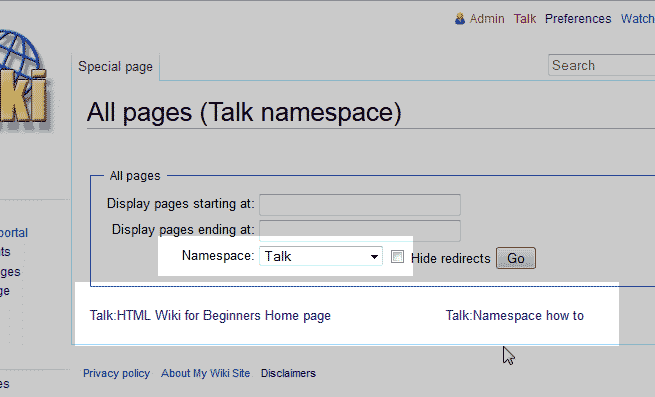

- Mediawiki hosting how to#
- Mediawiki hosting skin#
- Mediawiki hosting windows 10#
- Mediawiki hosting software#
There are other options like Bitnami’s image – but why stray from the official images? We can customize it to our liking without taking a performance hit which will be key. This is going to be our basis for the setup we’re going to run. To do so I suggest taking a look at the official Docker image page for Mediawiki.
Mediawiki hosting how to#
We suggest you start with their official instructions though I’ve covered how to install Docker in Debian 10 in another post about Mastodon.
Mediawiki hosting windows 10#
That’s right, you can host a wiki, using MediaWiki, even in a Windows 10 Docker container. Docker is just a cleaner way to try these things out – so we’re going to mark Docker as required for this project.Īgain, I don’t want to cover how to install Docker – we have assumed thus far you’re even running Linux though you don’t have to be. A fragile base system that might not get cleaned up should we decide to back out of our fun-time (maybe quarantine) project. A lot of the packages we like to discuss here on Kinda Lame are maybe not always the most complicated but they require a set of dependencies installed on your base system.
Mediawiki hosting software#
We love Docker at Kinda Lame! Simply put it’s the easiest way to try out software without hosing your Linux (or Windows) install. It is the embodiment of the original world wide web dream – so let’s get started.


Even in small business and corporate environments there is value in having a central data store for human knowledge and a searchable and linkable wiki is a great way to get that done. No matter the topic, fan pages, fiction or putting together a family background website – you can relatively easily and quickly start up a wiki site and start documenting whatever you’d like. And one of the coolest projects out there is the ability to self-host MediaWiki software that lets you start your own wiki site (like Wikipedia). There are too many cool projects out there to not take some time to play with and get your hands dirty. Administrators can enable an on-page paragraph giving credit to editors who've worked on a page.Here at Kinda Lame, we like self hosting things – being in control of our own software. Users can (optionally) specify a "real name" they want to use for author credits. Additionally, a diff is shown during an edit conflict so you can see exactly what you need to reintegrate. Side-by-side diffs - the diffs are shown side-by-side, and changed portions of lines are highlighted, making it much easier to see what's what."Related changes": View a filtered version of Recent Changes to the pages linked from the current page.Extended recent changes with dynamic collapsing of edits to the same article and quick links to diff the edit, show the article history, show the user page, show the user talk page, or block the user (for sysops).User contributions in the sidebar of each user page list all articles the user has worked on, according to the database.Watchlist Every page has a link "Watch this article for me".EasyTimeline for time charts (needs separate installed components).WikiHiero for Egyptian hieroglyphs (needs separate installed components).Automatic resizing of images using ImageMagick or libgd, simple syntax for image captions and image alignment.Mathematical formulas using LaTeX syntax.File upload feature allows to upload graphics or sound files.XHTML-compatible output (or darn close to it), tidy integration.Automatically turn ISBN numbers into links to an editable list of booksellers.Generate a table of contents for long articles (optional).Auto-number headings in an article (optional).Printable versions of articles can be generated."Stub" threshold: Users can see links to articles below a certain size rendered in a different color.User styles: Users can adapt the look and feel of the site through custom CSS on their user pages.Skins: Different ways to present the site.
Mediawiki hosting skin#


 0 kommentar(er)
0 kommentar(er)
